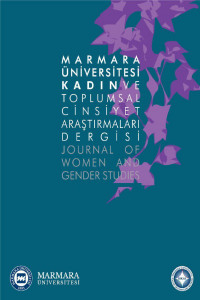Öz
Orthodoxy, which emerged as one of the most important components of Greek national identity, was further strengthened by the inclusion of the Eastern Roman Empire in the official narrative history as an intermediate period. When religion and/or sect becomes a part of national identity, an "other" is needed to strengthen this identity. Although it is the Ottoman/Turkish people constituting the official “other” of the Greek national narrative, also different “others” are seen in the texts. One of these “others” is Western/European, and the other is the woman. These native and foreign women are often marginalized covertly, rather than being directly marginalized like Ottomans/Turkish people or Western/European male characters. In this study, how the characters appearing in three novels of Alexander Papadiamantis published between 1879-1884 are marginalized in accordance with the Greek official narrative history and hegemonic gendered discourse, and the basis on which national identity was built has been examined.
Anahtar Kelimeler
Alexander Papadiamandis gender the image of the "other" 19th-century Greek novel historiography
Kaynakça
- Αποστολίδου, Β. (1995). Η Συγκρότηση και οι σημασίες της εθνικής λογοτεχνίας. In Επιστημονικό Συμπόσιο Εταιρείας Σπουδών Νεοελληνικού Πολιτισμού και Γενικής Παιδείας (Eds.), Έθνος-κράτος-εθνικισμός (pp. 15-39). Εταιρεία Σπουδών Νεοελληνικού Πολιτισμού και Γενικής Παιδείας.
- Βεϊκος, Θ. (1999). Εθνικισμός και εθνική ταυτότητα. Ελληνικά Γράμματα.
- Γκέφου-Μαδιανού, Δ. (2006). Εννοιολογήσεις του εαυτού και του "άλλου": ζητήματα ταυτότητας στη σύγχρονη ανθρωπολογική θεωρία. In Δήμητρα Γκέφου-Μαδιανού (Ed.), Εαυτός και "'Αλλος" Εννοιολογήσεις, ταυτότητες και πρακτικές στην Ελλάδα και την Κύπρο (pp. 15-110). Gutenberg,.
- Δημαράς, K. Θ. (2009). Νεοελληνικός διαφωτισμός, Ερμής.
- Καργάκος, Σ. (2003). Ἡ πολιτικὴ σκέψη του Παπαδιαμάντη. Ἀρμός.
- Λιάκος, Α. (1994). “Προς επισκευήν ολομελείας και ενότητος”: Η δόμηση του εθνικού χρόνου. Σκλαβενίτης, Τριαντάφυλλος Ε., 1948- (Eds.), Επιστημονική Συνάντηση στη μνήμη του Κ. Θ. Δημαρά (pp. 171-199). Iνστιτούτο νεοελληνικών ερευνών (Ε.Ι.Ε./Ι.Ν.Ε.).
- Μικέ, Μ. (2009). Έρως (αντ)εθνικός. Ερωτική επιθυμία και εθνική ταυτότητα τον 19ο αιώνα, Πόλις.
- Παπαδιαμάντης, Α. (1997). Άπαντα. Δόμος.
- Σακελλαρίου, Σ. (2013). Νόσος και θεραπεία στην πεζογραφία του Αλέξανδρου Παπαδιαμάντη Αποδελτίωση και σχόλια. (unpublished master's thesis). Πανεπιστήμιο Πατρών.
- Σκοπετέα, Έ. (1988). Το "Πρότυπο Βασίλειο" και η Μεγάλη Ιδέα: όψεις του εθνικού προβλήματος στην Ελλάδα, 1830-1880. Πολύτυπο.
- Σταματόπουλος, Δ. (2009). Το Βυζάντιο μετά το έθνος: το πρόβλημα της συνέχειας στις βαλκανικές ιστοριογραφίες. Αλεξάνδρεια.
- Τζανάκη, Δ. (2018). Φύλο και σεξουαλικότητα. Ξεριζόντας το «ανθρώπινο» (1801-1925). Ασίνη.
- Τζανάκη, Δ. ( 2019a). “Αναστροφή φύλου” 1816-2007. Κοινωνικές Επιστήμες 8-9-10. 276-293.
Öz
Orthodoxy, which emerged as one of the most important components of Greek national identity, was further strengthened by the inclusion of the Eastern Roman Empire in the official narrative history as an intermediate period. When religion and/or sect becomes a part of national identity, an "other" is needed to strengthen this identity. Although it is the Ottoman/Turkish people constituting the official “other” of the Greek national narrative, also different “others” are seen in the texts. One of these “others” is Western/European, and the other is the woman. These native and foreign women are often marginalized covertly, rather than being directly marginalized like Ottomans/Turkish people or Western/European male characters. In this study, how the characters appearing in three novels of Alexander Papadiamantis published between 1879-1884 are marginalized in accordance with the Greek official narrative history and hegemonic gendered discourse, and the basis on which national identity was built has been examined.
Anahtar Kelimeler
Alexander Papadiamandis gender, the image of the "other", 19th-century Greek novel, historiography.
Kaynakça
- Αποστολίδου, Β. (1995). Η Συγκρότηση και οι σημασίες της εθνικής λογοτεχνίας. In Επιστημονικό Συμπόσιο Εταιρείας Σπουδών Νεοελληνικού Πολιτισμού και Γενικής Παιδείας (Eds.), Έθνος-κράτος-εθνικισμός (pp. 15-39). Εταιρεία Σπουδών Νεοελληνικού Πολιτισμού και Γενικής Παιδείας.
- Βεϊκος, Θ. (1999). Εθνικισμός και εθνική ταυτότητα. Ελληνικά Γράμματα.
- Γκέφου-Μαδιανού, Δ. (2006). Εννοιολογήσεις του εαυτού και του "άλλου": ζητήματα ταυτότητας στη σύγχρονη ανθρωπολογική θεωρία. In Δήμητρα Γκέφου-Μαδιανού (Ed.), Εαυτός και "'Αλλος" Εννοιολογήσεις, ταυτότητες και πρακτικές στην Ελλάδα και την Κύπρο (pp. 15-110). Gutenberg,.
- Δημαράς, K. Θ. (2009). Νεοελληνικός διαφωτισμός, Ερμής.
- Καργάκος, Σ. (2003). Ἡ πολιτικὴ σκέψη του Παπαδιαμάντη. Ἀρμός.
- Λιάκος, Α. (1994). “Προς επισκευήν ολομελείας και ενότητος”: Η δόμηση του εθνικού χρόνου. Σκλαβενίτης, Τριαντάφυλλος Ε., 1948- (Eds.), Επιστημονική Συνάντηση στη μνήμη του Κ. Θ. Δημαρά (pp. 171-199). Iνστιτούτο νεοελληνικών ερευνών (Ε.Ι.Ε./Ι.Ν.Ε.).
- Μικέ, Μ. (2009). Έρως (αντ)εθνικός. Ερωτική επιθυμία και εθνική ταυτότητα τον 19ο αιώνα, Πόλις.
- Παπαδιαμάντης, Α. (1997). Άπαντα. Δόμος.
- Σακελλαρίου, Σ. (2013). Νόσος και θεραπεία στην πεζογραφία του Αλέξανδρου Παπαδιαμάντη Αποδελτίωση και σχόλια. (unpublished master's thesis). Πανεπιστήμιο Πατρών.
- Σκοπετέα, Έ. (1988). Το "Πρότυπο Βασίλειο" και η Μεγάλη Ιδέα: όψεις του εθνικού προβλήματος στην Ελλάδα, 1830-1880. Πολύτυπο.
- Σταματόπουλος, Δ. (2009). Το Βυζάντιο μετά το έθνος: το πρόβλημα της συνέχειας στις βαλκανικές ιστοριογραφίες. Αλεξάνδρεια.
- Τζανάκη, Δ. (2018). Φύλο και σεξουαλικότητα. Ξεριζόντας το «ανθρώπινο» (1801-1925). Ασίνη.
- Τζανάκη, Δ. ( 2019a). “Αναστροφή φύλου” 1816-2007. Κοινωνικές Επιστήμες 8-9-10. 276-293.
Ayrıntılar
| Birincil Dil | İngilizce |
|---|---|
| Bölüm | Makale |
| Yazarlar | |
| Yayımlanma Tarihi | 31 Aralık 2021 |
| Gönderilme Tarihi | 7 Aralık 2020 |
| Kabul Tarihi | 3 Kasım 2021 |
| Yayımlandığı Sayı | Yıl 2021 Cilt: 5 Sayı: 2 |


